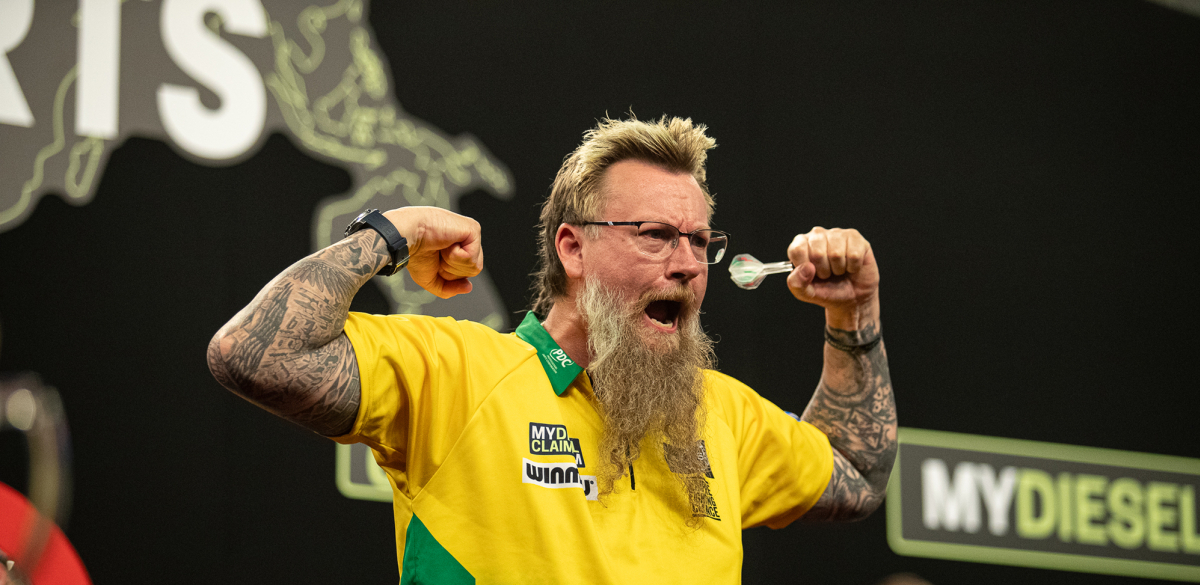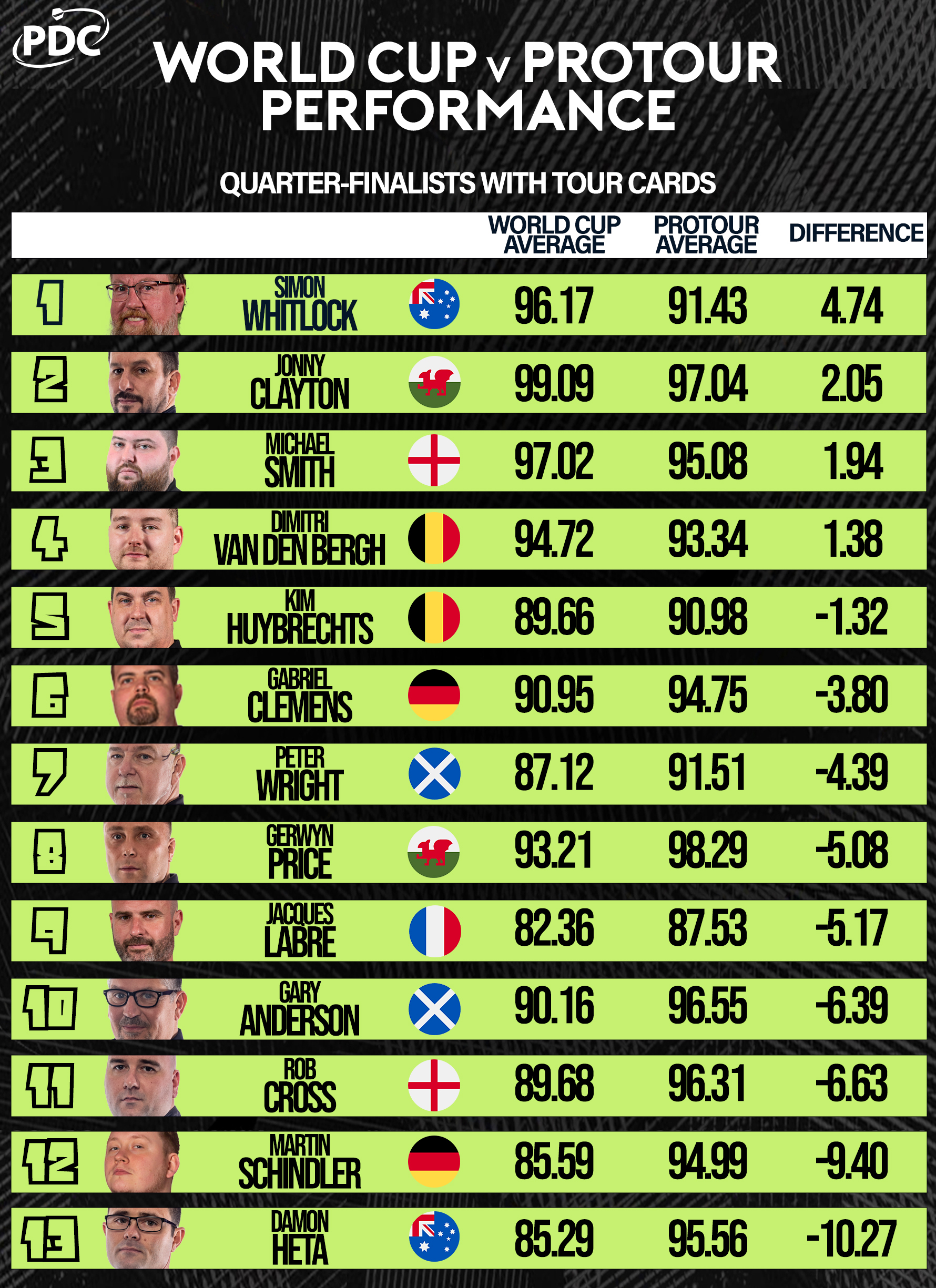
PDC stats analyst Christopher Kempf reflects on last weekend's My Diesel Claim World Cup of Darts, comparing the tournament averages of the World Cup quarter-finalists against their last 200 legs played on the ProTour...
The World Cup - now a 100% doubles event - has put players' cooperative abilities to the test like never before.
The PDC has never incorporated regular Doubles play into its tournament schedule, and thus players who have built their careers in the PDC system over many years have never needed to play on a team to earn any substantial income.
This is a difficult format to which to become accustomed, especially due to waiting three times as long to throw one's darts, and it's no surprise that most players underperform their usual singles averages in the World Cup.
Which players offer counter-examples to that trend, and thrive in Pairs play for the benefit of their countries?

The Polish team of Krzysztof Kciuk and Krzysztof Ratajski achieved a notable one-off success in their 5-1 group stage defeat of Lithuania, breaking a nine-year old record set by the illustrious Michael van Gerwen & Raymond van Barneveld Dutch team in 2014.
Despite this, Van Gerwen’s individual average of 125.56 from that match remains the highest televised average in darting history.
The Poles, like so many other Tour Card Holders in the tournament, underperformed their normal statistics on the ProTour, with neither player in their match against Germany rising to the average of their last 200 legs in Players Championship and Euro Tour events.
Of the 13 Tour Card Holders who featured in the quarter-finals and beyond, only four recorded a tournament average at the World Cup higher than their average recent level of performance in normal PDC Singles events.
The biggest overperformance belonged to Simon Whitlock, whose 91 average left him ranked 55th among Tour Card Holders over their last 200 legs, only for the Australian to produce the fifth highest average of the World Cup out of 80 players.
Whitlock’s contribution went far beyond high averages (though his team-mate Damon Heta averaged 11 points less than he). With one dart remaining in his hand and a finish possible, Whitlock closed out the leg in six out of 12 occasions, while Heta managed to convert in only 3 of 15.
By comparison, Whitlock (50%) was nearly twice as accurate on last-dart doubles as the victorious Welsh team (28%), all the while throwing 180s at a 60% higher rate than in recent ProTour encounters.
The most outstanding contribution in a deciding leg was Dimitri Van den Bergh's against the Dutch, in which the "Dreammaker" scored 140, 177 and checked out 32 with his first dart to average 147 in that leg, by far the highest of any of the 40 players involved in the tournament's 10 deciders.
Van den Bergh was another of the four players to have exceeded his ProTour average at the World Cup, hitting 156 scoring trebles in the tournament at a rate of 2.79 per leg, a rate exceeding that of the lead players of any of the other three teams in the semi-finals.
If any individual player could be said to have contributed the most to his team, it is Jonny Clayton, whose 99.09 average for the tournament was higher than that of any team or individual.
Clayton, who threw second for his team behind former World Champion Gerwyn Price, threw more trebles per visit in Wales' second visit to the board (1.38) than Price did in either Wales' first or third.
However, Clayton's greatest contribution to Wales' winning effort was in his finishing: of his 22 checkout attempts of 100 or less, Clayton won the leg for his country in 16 of them. With the opposing team also on a score of 100 or less, Clayton's record was even better: 11 of 14.
His partner struggled to close out the leg with three darts at a double, completing just 69% of those attempts, but support from Clayton meant that none of those missed attempts resulted in Wales losing a leg.
Price, however, contributed in his own way, with a greater number of trebles per leg (2.68) than Clayton and the highest conversion rate on ton-plus checkouts of any player in the quarter-finals or beyond.
Even if Price did not match his usual ProTour performance, Wales was the most balanced team and the deserving winner of the tournament.
Many of the World Cup pairings are marriages of players who happen to be at the top of their country's Order of Merit ranks, and not necessarily the players whose talents are most compatible with one another in a Doubles format.
We don't know whether the tendency of players to under-perform in the World Cup relative to the ProTour is simply a result of the format or whether giving players some choice in their doubles pairings would improve their performance.
Nevertheless, the all-Doubles format does seem to have rewarded teams with longer track records of collaboration, and it remains to be imagined how teams composed of best friends or practice partners would fare against all-star Order of Merit teams.
Follow Christopher on Twitter via @Ochepedia.

